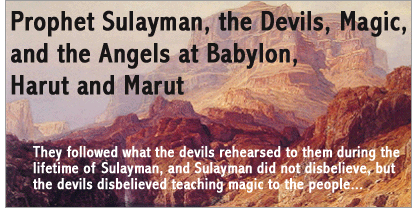
|
Imaam al-Shanqeetee's Clarification and Verification on the Magic that Expels From the Religion and A Note From Ibn Hajar al-Asqalaani
Filed under: Magic and the Occult Friday, November 02 2012 - by Abu.Iyaad |
Mail to a Friend • Printer friendly
The Ruling on Employing Magic and Learning It
Shaykh al-Ameen (rahimahullaah) explained that the saying of the majority of the Scholars - from them Abu Hanifah, Malik, the companions of Ahmad and others - regarding the one who uses magic and learns it is that he becomes a disbeliever by way of that, and in a narration from Ahmad, (is clarification of what) does not necessitate his disbelief. And Imaam al-Shafi'ee (rahimahullaah) clarified this matter and said:
When he learns magic, we say to him, 'Describe your magic to us' and if he describes that which necessitates kufr,such as what is in the magic of the people Babil (Babylon) of seeking nearness to the stars (through worship of them) and that such (acts) are done through which requests are made from them (the stars) then he is a disbeliever. And if it does not necessitate kufr, then if he believes in its permissibility, he is a disbeliever and if not, then he is not (a disbeliever)[1]And the saying of Shaykh al-Ameen (rahimahullaah) in this matter resembles the saying of al-Shaafi'ee and his associates in that he did not make takfir of a magician unless there is the commission of shirk with Allaah in his magic. So if it is done without committing shirk with Allaah then it does not reach the level of kufr[2], however it is prohibited with a very severe prohibition[3], so he (rahimahullaah) says, clarifying this meaning:
And that which is correct in this matter is to make detail (tafseel), so if the magic is that in which other than Allaah is venerated such as the stars and the devils and other than that from what leads to kufr, then it is kufr without any dispute. And from this type is the magic of Harut and Marut which is mentioned in Surah al-Baqarah, for it is kufr without dispute as is indicated by His saying, "Sulaiman did not disbelieve, but the devils disbelieved, teaching men magic..." (2:102) and the Exalted's saying, "But neither of these two (angels) taught anyone (such things) till they had said, 'We are only for trial, so disbelieve not (by learning this magic from us)'." (2:102), and His saying, "And indeed they knew that the buyers of it (magic) would have no share in the Hereafter." (2:102) and the Exalted's saying, "...and the magician will never be successful, no matter whatever amount (of skill) he may attain." (20:69)... and if the magic does not necessitate kufr, such as employing the use of the special properties of certain things like oils and other than them, then it is prohibited with a severe prohibition[3], but it does not make a person reach kufr (disbelief).[4]And Shaykh al-Ameen (rahimahullaah) tied the ruling on magic with what is connected to it of asbaab (ways, means). So if these ways and means are kufr and it cannot be performed except by nearness to the devils and the stars then it is from the types of magic on account of which the one who performs it disbelieves. And if its ways and means are not from what expels (from Islam), with the meaning that the magician does not venerate anyone besides Allaah, and does not claim that he knows the unseen, and does not direct anything from worship to other than Allaah, then this is not kufr, even if it comprises something of illusion, lying, deception and fraud. Rather it is a prohibited action, from the major sins.
And Imaam al-Nawawi (rahimahullaah) has speech which is close to this meaning, for he (rahimahullaah) said regarding the ruling upon magic:
It can sometimes be kufr and sometimes not be kufr, rather a great act of disobedience. So if there is a saying or action which necessitates kufr, then he has disbelieved, and if not, then no. As for learning it and teaching it, then it is unlawful. So if it comprises something that necessitates kufr, then he disbelieves and if not, then no. And if there is not anything in it which necessitates kufr then he is to be disciplined, and is asked to repent from it, and he is not killed in our view (when the magic does not comprise kufr). So if he repents, then his repentance is accepted.[5]And from this it becomes clear that the speech of the Scholars (may Allaah have mercy upon them) agrees with what has been said by Shaykh al-Ameen (rahimahullaah) of not making takfeer of the magician unrestrictedly. Rather, there is tafseel (detail) in the matter - as has just passed.
And Ibn Hajar al-Asqalaani said in Fath al-Baaree (10/224):
And this verse (2:102) has been used as a proof that sihr (magic) is kufr and the one who learns it is a disbeliever, and this is very apparent with respect to some of its types which I have already mentioned, which involves worship of the devils and the stars. But as for the other type which is from the angle of trickery (sha'wadhah) then the one who learns it does not become a disbelieiver by it.
NOTES
[1] Refer to Adwaa al-Bayaan (4/455), Sharh al-Nawawi alaa Saheeh Muslim (14/176), al-Mughnee (12/300), Tayseer al-Azeez al-Hameed (p. 384), and Kitab al-Deen al-Khaalis (2/322).
[2] See a similar explanation from Shaykh Ibn Baz (rahimahullaah) in this article.
[3] This includes the magic of illusions which are performed as trickery and deceiving the people but without the use of the devils.
[4] Adwaa al-Bayaan (4/456).
[5] Sharh al-Nawawi alaa Saheeh Muslim (14/176).
Link to this article: Show: HTML Link • Full Link • Short Link
Related Articles:
Add a Comment (comments are currently moderated)
You must be registered and logged in to comment.
| Search This Site |
| Tags | |
The Dajjaal (Anti-Christ) is the One-Eyed Liar
Sorcerers, Magicians are the Worshipers of the Devils

